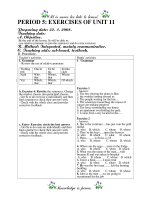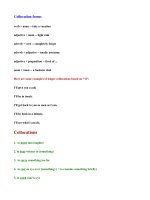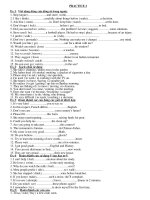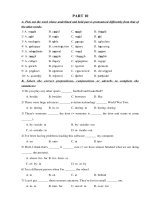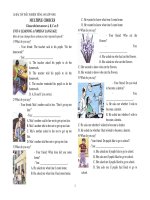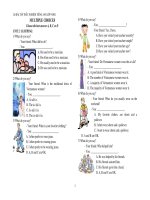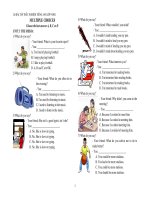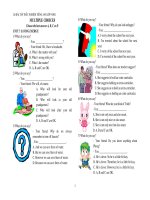- Trang chủ >>
- Lớp 6 >>
- Giáo dục công dân
Determiners Exercise
Bạn đang xem bản rút gọn của tài liệu. Xem và tải ngay bản đầy đủ của tài liệu tại đây (438.86 KB, 3 trang )
Determiners
Exercise
Determiners are words like all, none, most, both and half. They go before nouns. Can you
use determiners correctly? Take a moment to do this interactive grammar exercise.
1. I don't like ....................... of my physics teachers.
either
neither
both
Not either means the same as neither. The sentence given above can also be written as: I
like neither of my physics teachers.
2...
people don't trust politicians.
Most
Most of
We use most of before a pronoun or a noun with a determiner.
3. NGÏther................... on
S2 S521 552 the door.
keys open
key opens
key open
After either and neither we use a singular noun and a singular verb.
4. Noither OÍ,................o.coccceeescesee
se ssese valid.
this argument is
these arguments is
these arguments are
After neither of, we use a plural noun and a singular verb.
Source: www.englishgrammar.org
Determiners
.......
Exercise
the shops are closed on Sundays.
Most
Most of
Either could be used here
We use most before a noun without a determiner.
6. They spend ........................-.. their income on movies.
half
half of
Either could be used here
We can leave out of after all, both and half.
Lo
Ho ĐH 9
9 9609009009609
0596 my friends wished me on my birthday.
No one of
None of
None
Ô............cceee.e child was given a present.
Each
Each of
Either could be used here
`"...
his ideas are quite interesting.
All
All of
Either could be used here
We can leave out 'of' after all when they are followed by nouns.
Source: www.englishgrammar.org
Determiners
Exercise
10.........................o-ccs
Both of
Either could be used here
We can leave out 'of' after both when they are followed by nouns.
11. His ideas are .........................-.. different from those of his peers.
little
less
least
12. The new job ỉsn't........................‹.-.«<‹ different from the old one.
many
much
most
PLAY AGAIN
!
Answers
1. I don’t like either of my physics teachers.
2. Most people don’t trust politicians.
3. Neither key opens the door.
4. Neither of these arguments is valid.
5. Most of the shops are closed on Sundays.
6. They spend half / half of their income on movies.
7. None of my friends wished me on my birthday.
8. Each child was given a present.
9. All of / All his ideas are quite interesting.
10. Both / Both of my children are engineers.
11. His ideas are little different from those of his parents.
12. The new job isn’t much different from the old one.
Source: www.englishgrammar.org
